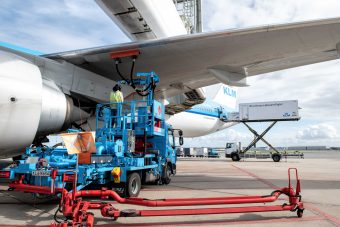
Travel is an integral part of modern life, and today the question is no longer whether it should become more environmentally sustainable, but only how to do it.
Air France – KLM has been setting sustainable business as its corporate goal for many years. Numerous projects such as fleet modernization, disposable plastic disposal, recycling, carbon offset programs, and sustainable aviation fuel development aim to reduce the carbon footprint and contribute to a more sustainable future.
For 16 years in a row, Air France – KLM has been the aviation industry leader in the field of sustainable business according to the Dow Jones index. But now the group is going a step further – working on the development and regular use of sustainable aviation fuel (SAF). SAF is one of the key factors in the ecological transition of aviation, more precisely in the reduction of carbon dioxide emissions.
What is SAF and why is it so important
Sustainable aviation fuel is a jet fuel made exclusively from renewable sources, such as used edible oil, wood residues or synthetic kerosene. It can replace ordinary fossil fuel or be added to it without any engine modifications and additional costs. SAF differs from ordinary bio-fuel because the principle of sustainability is applied in the production itself, which means that its production does not lead to deforestation or reduction of food production. Currently, SAF is the most important factor in the fight for more sustainable aviation industry because its use can reduce carbon dioxide emissions by as much as 75 per cent!
In focus:
Start of regular use of sustainable aviation fuel
Air France – KLM (Air France, KLM, Transavia) airlines began using SAF on all their flights from France and the Netherlands in early 2022 to reduce carbon dioxide emissions. For now, between 0.5 per cent and 1 per cent of sustainable aviation fuel is added to ordinary fuel on these flights. This pioneering step is the crown of decades of work on the implementation of SAF in the aviation industry.
Back in 2009, KLM was the first airline to introduce biofuel on its flights, and since 2011 both KLM and Air France have started using sustainable fuel on their commercial flights. In February 2021, KLM conducted the world’s first commercial flight using synthetic kerosene produced based on carbon dioxide, water and renewable solar and wind energy. In May 2021, Air France made the first long-haul flight between Paris and Montreal using SAF produced in France, while in October of the same year, on a flight between Paris and Nice, as much as 30 per cent of SAF was in the fuel mixture used by Air France. According to the current technological conditions, a maximum of 50 per cent of sustainable aviation fuel can be used on flights.
Challenges

To date, the use of sustainable aviation fuel on commercial airline flights has been less than 0.1 per cent. The sustainable aviation fuel industry is still in its infancy period and, therefore, faces many challenges.
The first is insufficient production – simply, there are still not enough factories that produce this type of fuel, so it is presently not possible to immediately introduce a larger amount of SAF into consumption. The problem connected with lower production is a higher price of SAF fuel – currently the production of SAF is four times more expensive than fossil kerosene.
In terms of money, a ticket for a flight that uses 0.5 per cent to 1 per cent of sustainable aviation fuel will cost between 1 and 12 euros more, depending on the length of the flight and the class in which the passenger is flying. The aviation industry hopes that the development of the production and use of SAF will lead to its reduction in price.
Only together can we make a big step towards a sustainable future
So far, Air France – KLM has offered passengers the opportunity to compensate for their carbon footprint through various programs (for example, money raised by the KLM CO2ZERO initiative was used to afforest our planet, and over a thousand hectares of rainforest have been planted in Panama).
From January 13, 2022, passengers can also buy additional sustainable aviation fuel and thus directly reduce carbon dioxide emissions. In addition to individuals, companies can also contribute to the energy transition of aviation through Air France – KLM Corporate SAF program. To achieve a significant reduction in carbon dioxide emissions, different industries and companies must work together because only in this way can demand be stimulated, and thus the production and availability of SAF. Investing in the Corporate SAF program provides companies with the opportunity to actively initiate the transition from conventional fossil fuels to SAF and thus reduce the environmental footprint of their business flights.
Read the story in the new issue of the Energy portal Magazine ELECTROMOBILITY.



